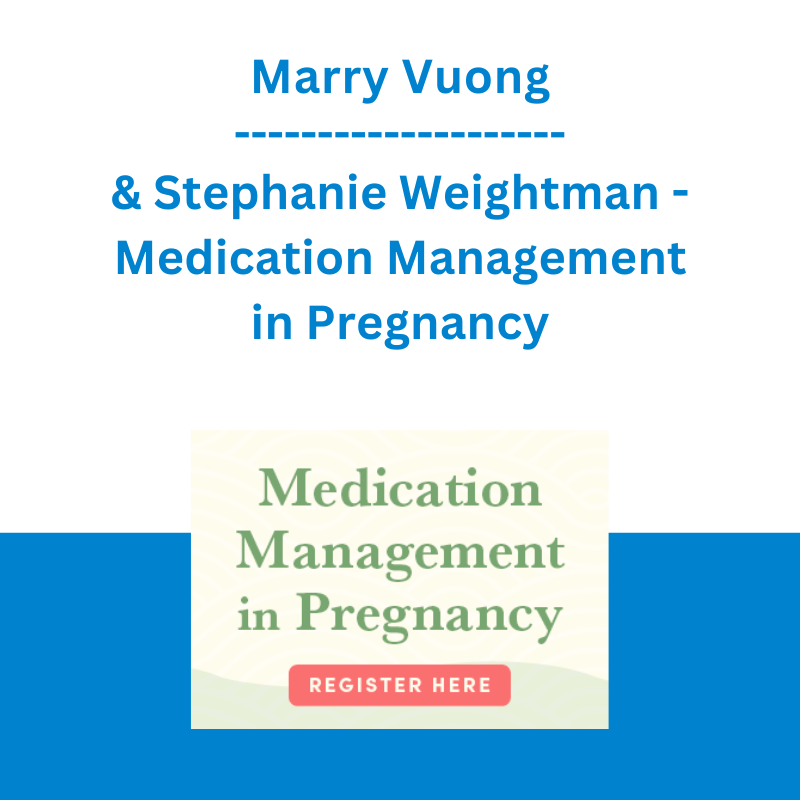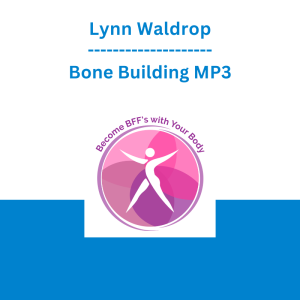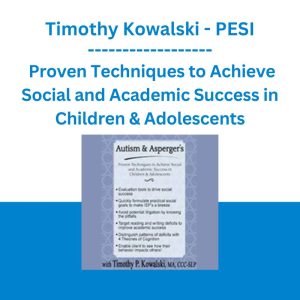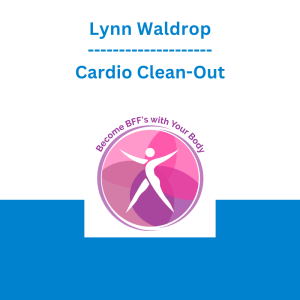*** Proof of Product ***
Exploring the Essential Features of “Marry Vuong & Stephanie Weightman – Medication Management in Pregnancy: A Comprehensive Course for Healthcare Professionals”
When you work with pregnant women, it is crucial to select medications that are the safest for not only the mother but for the baby as well.
You need to provide counseling and education from pre-conception to post-partum… all while ensuring you have the most up-to-date pharmacotherapy guidance to confidently select or change medications balancing the risk-benefit for the patient and the fetus.
Taught by two expert maternal/pediatric pharmacists, our course equips you with the knowledge and skills to safely prescribe and manage medications for pregnant patients, addressing the unique challenges and complexities.
This course will elevate your skills to…
- Provide individualized pre-conception counseling
- Select medications that are safe before, during and after pregnancy
- Care for pregnancy specific conditions, including gestational diabetes, hypertension, preeclampsia and more
- Prescribe medications for mental health conditions, PCOS, and infertility
- Manage pregnant women with opioid addiction during their pregnancy and through delivery
- Keep up-to-date with the latest guidelines from ACOG, AWHONN, ABM, USPSTF and more
Embark on a transformative journey through the perinatal pharmacology landscape. Navigate the intricate world of pharmacotherapy with the latest evidence, empowering you to make informed decisions that prioritize both maternal well-being and the health of the precious fetus.
Register now to be confident that you are able to make the right decisions for medication management in pregnancy!
Medication Management in Pregnancy Course Outline
Module 1: Pre-Conception Counseling: Approaching Lifestyle Modifications
- Goals of Pre-conception counseling
- Weight Management
- Diet and Nutrition
- Psychosocial Factors
- Substance Use
- Environment/Occupational Hazards
Course Outline
Goals of Pre-conception counseling
Weight Management
- BMI Goals
- Unhealthy Weight Risks
Diet and Nutrition
- Vitamins and Minerals
- Caffeine Intake
- Exercise
Psychosocial Factors
- Stress and Anxiety
- Emotional Support
- Relationships
Substance Use
- Alcohol
- Other Drugs
- Tobacco/Smoking Cessation
Environment/Occupational Hazards
- Mercury/Lead/Pesticides
- Higher Risk Occupations
Module 2: Pre-Conception Counseling: Obtaining a Medical History and Determining Risk Factors before Prescribing
- Components of Pre-Conceptual Medical History
- Fetal/Neonatal and Maternal Risks
- Psychiatric/Mental Health
- Risks/Classes of Medication
- Supplements/OTC
- Age-related risks
- Genetic Factors/Family History
- Labs
- Past pregnancies/miscarriages
Course Outline
Part 1: Obtaining a Medical History
Components of Pre-Conceptual Medical History
- Menstrual and Reproductive History
- Pre-Existing Chronic Medical Conditions
- Hypertension
- Epilepsy
- Thyroid Disease – hyper and hypo
- Rheumatoid Arthritis/Lupus – Anti-inflammatories, biologics
- Hepatitis/HIV
- STIs – G/C, Chlamydia, HSV, Syphilis
- Pregestational Diabetes Mellitus
- Fetal/Neonatal and Maternal Risks
Psychiatric/Mental Health
- Anxiety/Depression – SSRI’s/TCSs
- Bipolar – Lithium
- Schizophrenia – Antipsychotics
Risks/Classes of Medication
Supplements/OTC
Other medications
Immunizations
Part 2: Determining Risk Factors
Age-related risks
- Education and effect of age on fertility
- Women > 35 years
- Women > 40 years
Genetic Factors/Family History
- Carrier Screening
- CF/Spinal Muscular Atrophy
- Others
- Red Flags
Labs
- Standard Panel
- Selective Panel
Past
pregnancies/miscarriages
Module 3: Polycystic Ovarian Syndrome (PCOS) and Fertility Treatments
- PCOS…patho, symptoms, risk factors, prevention of progression, and co-morbidities
- Infertility…evaluation, lifestyle, ovulation induction, intrauterine Insemination, and IVF
Course Outline
PCOS
- Pathophysiology of the condition
- Diversity of symptoms
- Risk factors and conditions related to PCOS
- Goal-specific therapy options for symptoms
- Prevention of progression and/or co-morbidities
Infertility
- Initial Evaluation
- Lifestyle Modifications
- Ovulation Induction and Timed Intercourse
- Intrauterine Insemination
- In Vitro Fertilization
Module 4: The Highs and Lows of Diabetes Management in Pregnancy
- Overview of Pre-Gestational Diabetes
- Impact on Pregnancy… maternal and fetal
- Gestational Diabetes
- Management During Pregnancy
- Post Partum Adjustments
Course Outline
Overview of Pre-Gestational Diabetes
- Diabetes Burden
- Diagnostic Criteria
Impact on Pregnancy
- Maternal
- Fetal
- Medication Changes
Gestational Diabetes
- Risk Factors
- Early Screening Strategies
- Glucose Tolerance Testing
- Placenta Induced Insulin Resistance
- Comparison of Insulin Needs During Pregnancy
Management of Gestational Diabetes
- A1C Goals
- Lifestyle Management
- Insulin Initiations
- Insulin Adjustments
Other Considerations
Post Partum
Adjustments
Module 5: Substance Abuse Management in Pregnancy
- Medication/Opioid Use in Pregnant Mothers
- Medications of Abuse
- Treatment Strategies
- Medication Assisted Strategies
- Pain Management in Pregnancy
- Neonatal Abstinence Syndrome
Course Outline
Medication/Opioid Use in Pregnant Mothers
- Pathophysiology
- Risk Factors Screening
- Barriers to Care
Medications of Abuse
- Benzodiazepines
- Heroin
Treatment Strategies
- Cessation
Medication Assisted Strategies
- Methadone
- Buprenorphine
- Naltrexone
Pain Management in Pregnancy
- Chronic Pain
- Intra-labor Pain Control
- Post Partum Pain
Neonatal Abstinence Syndrome
Key Take-Aways
Module 6: Managing Hypertensive Disorders in Pregnancy
- Blood Pressure Management in Pregnancy
- Chronic hypertension, gestational hypertension, preeclampsia, and eclampsia
- Treatment Algorithms for Hypertension
- Medication options and protocols
- Assessing Side Effects and Creating Treatment Plans
Course Outline
Blood Pressure Management in Pregnancy
- Importance and impact on maternal and fetal health
Section 2: Blood Pressure Disease States in Pregnancy
- Differentiating chronic hypertension, gestational hypertension, preeclampsia, and eclampsia
- Clinical criteria and diagnosis
Treatment Algorithms for Hypertension
- First-line antihypertensive medications
- Alternative medications
- Step-by-step guide to managing hypertensive emergencies
- Pre-eclampsia
- Medication options and protocols
Assessing Side Effects and Creating Treatment Plans
- Common side effects of antihypertensive medications
- Developing personalized treatment plans based on patient profiles
Conclusion
Module 7: Preventing Post Partum Complications: It Starts with Education
- Gestational Diabetes Mellitus (GDM) Postpartum
- Postpartum Hypertension
- Infections After Delivery
- Postpartum Depression
- Hemorrhoids and Constipation
- Perineum Pain
- Collaborative Care and Patient Education
Course Outline
Introduction
- Overview of postpartum period and common complications
- Importance of recognizing and managing postpartum complications
Gestational Diabetes Mellitus (GDM) Postpartum
- Understanding GDM and its postpartum implications
- Management strategies and medications
- Patient education on monitoring blood sugar levels
Postpartum Hypertension
- Identification and causes of postpartum hypertension
- Medication and lifestyle management
Infections After Delivery
- Common postpartum infections (e.g., surgical site infection, superficial, deep)
- Role of antibiotics and other treatments
- Educating patients on signs of infection and prevention measures
Postpartum Depression
- Symptoms and risk factors of postpartum depression
- Therapeutic approaches including medication and counseling
- Importance of mental health support and patient education
Hemorrhoids and Constipation
- Causes and symptoms of postpartum hemorrhoids and constipation
- Treatment options including medications and dietary adjustments
- Providing advice on preventive measures and home care
Perineum Pain
- Causes of perineum pain postpartum
- Pain management techniques and medications
- Patient education on healing and pain relief strategies
Collaborative Care and Patient Education
Strategies for effective collaboration among healthcare providers
Comprehensive patient education on recognizing and addressing postpartum complications
Resources and support systems for postpartum care
Medication Management in Pregnancy Faculty
Stephanie Weightman, PharmD, BCPS, BCPPS, BCEMP, is the head of clinical operations at Perfecting Peds, which focuses on optimizing pediatric patient outcomes through evidence-based interventions. With triple board certifications in pharmacotherapy, pediatric pharmacotherapy, and emergency medicine coupled with specialized skills in pharmacy education, her mission is to ensure that every pediatric patient receives the highest standard of care with an individualized approach. Leveraging a background that includes roles at a digital education company, clinical drug information, and over a decade at the bedside, she has extensive expertise within the pediatric population.
Marry Vuong, PharmD, BCPPS, is a Board Certified Pediatric Clinical Pharmacist and Head of Staff at Perfecting Peds. She completed her Bachelor’s Degree in Nutrition and Doctorate in Pharmacy from the University of Florida. She then completed her PGY-1 Pediatric Pharmacy Residency at Nicklaus Children’s Hospital where she worked for almost six years as a Neurology/Neurosurgery/General Pediatrics Clinical Pharmacy Specialist.
BONUS TOPICS!
That’s Not All! Register Today to Receive THREE FREE Bonus Modules on Perinatal Care…
Maternal Mental Health and Pregnancy: Can Perinatal Mood Disorders be Prevented?
Lisa Tremayne, RN, PMH-C, CBC
Perinatal Mood & Anxiety Disorders (PMADs) are the number one complication during pregnancy and childbirth, affecting over 20% of pregnant and postpartum women. Learn what you need to start to be able to identify these women, screen them appropriately, and refer to resources and treatment that is appropriate for this temporary and treatable illness.
- Baby Blues, Unipolar/Major Depression, Bipolar Disorder
- Perinatal Anxiety Disorders, Schizoaffective/Schizophrenia, Postpartum Psychosis
- Borderline Personality Disorder, Posttraumatic Disorder, Obsessive-Compulsive Disorder
- Talking to Your Patient About Mental Health, Screening, and Treatment
- Administering and Scoring the Screening Tools
- Starting and Follow Up Treatment
- Education and Resources
Integrative Maternity Health Care
Kathy Fray
“Maternity Integrative Healthcare” (aka “Perinatal Integrative) is a pioneered leading-edge holistic approach to maternal and neonatal integrative wellness Learn to work with pregnant/laboring/postpartum clients to confidentially embrace their own integrative healthcare, to support preventing complex pregnancies, and support preventing labor complications.
- IMHC/PIM: Integrative Maternity HealthCare aka Perinatal Integrative Medicine (incl definitions)
- Five Categories of CAMs (Complementary & Alternative Medicine) and T&CMs (Traditional & Complementary Medicines)
- New Terms: TCHTs & MMTs
- Common Discomforts of Pregnancy
- Pregnancy Pathophysiology
- Labor & Birth Preparation
- ‘Wholistic Birth-Rite’ Kit Prep
- Stages of Labor…latent & active dilatation, birth, after-birth (placenta)
- Holistic support for Natural Labor & Normal Birth
- Complementary support for Medical Complexities & Obstetric Complications
Managing Hypertension and High Stress in Pregnancy: A Somatic Approach
Parijat Deshpande, MS, CTP, CCTS-I
View bestselling author and trauma-informed health strategies, Parijat Deshpande talks about the hidden realities of stress physiology. Through a combination of science, research, and riveting anecdotes, she will bust commonly held myths about stress, review why stress is not a mental health issue or a relaxation issues and show audience members how understanding the intersection between stress and hypertension can help you empower your patients for an even healthier pregnancy.
- Common myths about stress
- What is the stress physiology cycle?
- Why does a cycle not complete? (Acute/chronic/traumatic stress)
- The intersection of stress and hypertension in pregnancy
- The role of the nervous and immune systems in hypertension during pregnancy
- Biological, racial, societal, social, etc, risk factors
- Movement and posture as mediating (and possibly moderating) variable for hypertension
- The role of the provider/practitioner
- Identifying stress without pathologizing stress
- Trauma-sensitive approaches to asking questions, listening for answers, and building trust
Please see the full list of alternative group-buy courses available here: https://lunacourse.com/shop/










 Crypto Dan - The Crypto Investing Blueprint To Financial Freedom By 2025
Crypto Dan - The Crypto Investing Blueprint To Financial Freedom By 2025  Sovereign Man Confidential - Renunciation Video
Sovereign Man Confidential - Renunciation Video  Forexmentor - Recurring Forex Patterns
Forexmentor - Recurring Forex Patterns  Lynn Waldrop - Bone Building MP3
Lynn Waldrop - Bone Building MP3  Frequency Separation for Portraits - Lisa Carney
Frequency Separation for Portraits - Lisa Carney  Team NFT Money - Ultimate NFT Playbook
Team NFT Money - Ultimate NFT Playbook  The Daily Traders – Exclusive Trading Mentorship Group
The Daily Traders – Exclusive Trading Mentorship Group  Oliver Velez - Essential Strategy Of Trade For Life
Oliver Velez - Essential Strategy Of Trade For Life  Matthew Kratter - Trader University
Matthew Kratter - Trader University  Marcus Rideout and Nik Koyama - Video Wordsmith
Marcus Rideout and Nik Koyama - Video Wordsmith  Fred Haug - Virtual Wholesaling Simplified
Fred Haug - Virtual Wholesaling Simplified  Toshko Raychev - Profit System + ITF Assistant
Toshko Raychev - Profit System + ITF Assistant  Matan Feldman - The 13-Week Cash Flow Modeling - Wall Street Prep
Matan Feldman - The 13-Week Cash Flow Modeling - Wall Street Prep  Dave Landry - Stock Selection Course
Dave Landry - Stock Selection Course  Trade Like Mike - The TLM Playbook 2022
Trade Like Mike - The TLM Playbook 2022  Emanuele Bonanni - My Trading Way
Emanuele Bonanni - My Trading Way  Problem Prospecting Online Programme - Mark, Rich, Stu
Problem Prospecting Online Programme - Mark, Rich, Stu  Pat Mitchell - Crystal Ball Pack PLUS bonus Live Trade - Trick Trades
Pat Mitchell - Crystal Ball Pack PLUS bonus Live Trade - Trick Trades  Autism & Asperger's: Proven Techniques to Achieve Social and Academic Success in Children & Adolescents - Timothy Kowalski - PESI
Autism & Asperger's: Proven Techniques to Achieve Social and Academic Success in Children & Adolescents - Timothy Kowalski - PESI  Greg O’Gallagher - The Complete Kinobody Fitness 6 Bundle
Greg O’Gallagher - The Complete Kinobody Fitness 6 Bundle  Willis University - Forex Millionaire Course
Willis University - Forex Millionaire Course  Flirting Deconstructed
Flirting Deconstructed  SMB - Options Training
SMB - Options Training  Racing Workshop - Complete Online Package
Racing Workshop - Complete Online Package  George Fontanills & Tom Gentile - Optionetics 6 DVD Series Home Study Course (Digital Download)
George Fontanills & Tom Gentile - Optionetics 6 DVD Series Home Study Course (Digital Download)  Pat Mitchell - War Room Psychology Vol. 4 - Trick Trades
Pat Mitchell - War Room Psychology Vol. 4 - Trick Trades  Atlas API Training - API 570 Exam Prep Training Course
Atlas API Training - API 570 Exam Prep Training Course  Money Miracle - George Angell - Use Other Peoples Money To Make You Rich
Money Miracle - George Angell - Use Other Peoples Money To Make You Rich  Chris Capre - Advanced Price Action Ongoing Training & Webinars
Chris Capre - Advanced Price Action Ongoing Training & Webinars  TradingWarz - Algorithm Limit Trading Systems
TradingWarz - Algorithm Limit Trading Systems  Jesse Livermore Trading System - Joe Marwood
Jesse Livermore Trading System - Joe Marwood  The Business of Professional Photo Retouching - Lisa Carney & Simon Peter Raible
The Business of Professional Photo Retouching - Lisa Carney & Simon Peter Raible  Lynn Waldrop - Cardio Clean-Out
Lynn Waldrop - Cardio Clean-Out  Orderflows Gems 2-Private Sessions - Mike Valtos
Orderflows Gems 2-Private Sessions - Mike Valtos  Juan Romero - The Art of Artificial Evolution
Juan Romero - The Art of Artificial Evolution